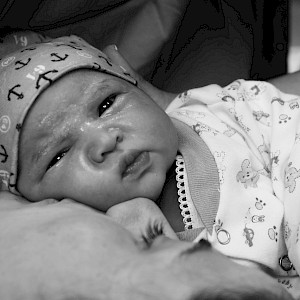The importance of birth partners
To have a birth partner at your side is as important as having a midwife in my opinion – but that is my personal point of view. Even if that birth partner isn’t your husband/wife/life partner, he or she is at your side to support you throughout labour. A birth or labour partner’s role is always led (or should be) by the person giving birth, meaning by the person they’re supporting. You might want a massage, or you need help to move around, keep active and hydrated, keep you happy, comfortable, and mentally supported throughout labour. If you choose to use Hypnobirthing techniques, your birth companion can also help you to relax and stay focused on your breathing, remind you of not holding your breath or simply just hand you your headphones etc.
A birth partner isn’t just an assistant!
Labour partner can be your ears, eyes and your voice. If your birth journey takes and unexpected turn, you might want someone who can comfort you and help you to make informed decisions. Someone who can help to ask questions and tell the midwife/doctor what you need and want. During labour you want to focus on birthing your baby rather than talking and worrying about stuff. Of course, the birth companion does not make any decisions without you, but he or she can certainly help to get all the details and speak to you then. Or simply can help you to get all information needed, before making a decision. A birth partner can also track your contractions and all other things during labour and make the call to the midwife when surges are regular (every 3-4 minutes).
Who can be birth partner?
Your birth partner can be a relative or friend or your partner, if you have one. But you are not restricted to friend, spouse or relative – you can also hire a private midwife or a doula. A doula is someone who provides guidance and support before, during and after childbirth and who is typically without formal obstetric training but usually with lots of experience of childbirth. Whoever you choose to be at your side during labour, you should never feel pressured to pick a particular person as your birth partner. Having the right birth partner is too important. You should not worry about hurting anybody’s feelings by not picking them as your labour partner. It is a very personal and important decision. Your baby, your body, your birth and YOUR decision! A birth partner should be someone you trust and who you feel will support you most during labour. You can also have more than one birth partner if you wish, but please always check with your birth location first, if there is a limit on the number of people you can have with you during childbirth.
What do birth partners do?
A birth partner is at your side to support you and keep you as calm, relaxed and comfortable as possible. The birth partner will be sensitive to your needs and will be able to reassure and comfort you, even in difficult situations. A birth partner’s role is to be calm and positive under pressure and to speak to you calmly or even explain to you what’s happening clearly and calmly or takes control, if you need them to. A birth partner should understand your birth preferences, certain relaxation techniques, the importance of breathing techniques and upright positions or movement during labour. And finally, being a good birth partner means also, that he or she should know, that YOU make any final decisions about what happens during childbirth – even if that means you change your mind on pain relief or birth environment or anything else.
Do birth partners need to be prepared?
Well, birth partners should know you, your birth preferences, birth right perhaps and options regarding certain choices in labour. It is perhaps helpful to visit any birth preparation classes beforehand together, such as antenatal or hypnobirthing classes etc. This will be a great opportunity for you and your birth partner to understand your body and what’s happening during childbirth. Furthermore, it’s a chance to learn and practice relaxation and breathing techniques together or any other coping techniques such as upright, forward, and open positions during labour to help your baby move down the birth canal. A birth partner might also be prepared mentally as childbirth can be an overwhelming and intense experience. Labour can last several days and might be mentally challenging and draining for the birth partner, too. That’s one of the reasons why I always invite birth partners to attend my hypnobirthing courses as well – woman and birth partner prepare together, mentally, and physically in order to face childbirth strong and confident together.
Final words
Dad matters – even if your partner/spouse isn’t a big fan of attending birth preparation classes with you or isn’t a big believer of hypnobirthing techniques etc. – dad matters as he still can be your rock during childbirth if you chose him to be your birth partner. Dad doesn’t necessarily need to believe or practice with you; he just needs to understand what is important to you and what might help you during labour. Reminding you to breathe in between or telling you, that you are safe and doing amazing might be all you need during labour.














